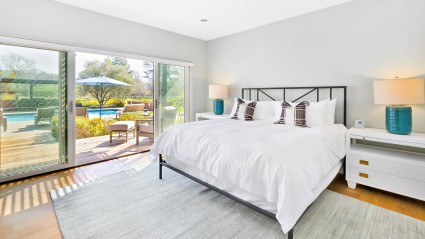Beyond the basics: Outstanding amenities in every Pacaso
As you browse Pacaso listings, you may notice this repeated phrase: “The home comes fully furnished and professionally decorated.” One standout feature of a Pacaso is the But a Pacaso is more than just a pretty face! Beyond the visible design elements, our homes are supplied with all the necessities and special touches that make an owner’s stay relaxing and easy. And for families with children or grandchildren, we've made sure our Family-Friendly Second Homes™ are equipped with all the essentials for a comfortable stay — we want you to spend less time packing and more time having fun! Here’s a peek inside the cupboards and closets of our Pacaso homes. Dining delights Whether your idea of a dream dinner is a homemade multicourse feast or takeout by the pool, we’ve got you covered. Kitchens are stocked with all the food-prep essentials and then some, including an array of high-end pots and pans, pizza stones, mixing and measuring sets, German cutlery, and all manner of bakeware. Plus, countertop appliances like multicookers, stand mixers, blenders and more make it fast and easy to whip up your favorite treats. When you don’t feel like cooking, you can serve fresh bakery croissants or a charcuterie assortment in style, using our sophisticated white porcelain china and Portuguese flatware. For your morning pick-me-up, choose from Nespresso or standard brew (or use the electric kettle for a cup of tea). When winding down, our barware collection caters to nearly every preference, whether you bring along red, white, bubbly or create a custom cocktail. Bed, bath and … BBQ Beds are fitted with quality linens, luxurious duvets and assorted pillows. Bathrooms are stocked with plenty of towels, hair dryers, a scale and magnifying mirror, and basic toiletries like shampoo, conditioner, body wash and soap. For homes with outdoor entertaining spaces, you’ll find gas barbecues, fire pits, outdoor drinkware and dinnerware and patio furniture. If the home has a pool, we even supply floaties for added fun, while beachfront homes are stocked with beach chairs for relaxing by the ocean. Work and play If you need to catch up on work during your stay, you can count on high-speed internet throughout the home, a charging station and, in many homes, a dedicated work space. Once you’ve logged off for the day, sit down with the family to enjoy one of the provided games, like Jenga, backgammon or cards. If you’re looking for more modern forms of entertainment, never fear — all Pacasos have smart TVs and streaming services so you can catch a show, tune into your favorite sporting event or keep the kiddos entertained while you enjoy a quiet moment watching the sunset with a glass of wine. Speaking of little ones, our Family-Friendly Second Homes are equipped with kid-friendly dinnerware and cutlery, a high chair, booster seat and Pack ‘n Play. And homes in beachfront and warm climates come equipped with beach chairs and pool floaties for bonus fun in or by the water. Household necessities Need to clean up some spilled spaghetti sauce? Or change a light bulb in the hall? While we focus on luxury living, we’ve also prepared our homes for those less-than-glamorous aspects of daily life. Mops, brooms, cleaning supplies, extra light bulbs and batteries, an iron and steamer, and even a mini-toolkit are provided to ensure you have what you need, when you need it, to handle the little details of your stay. See the full list of
Read









